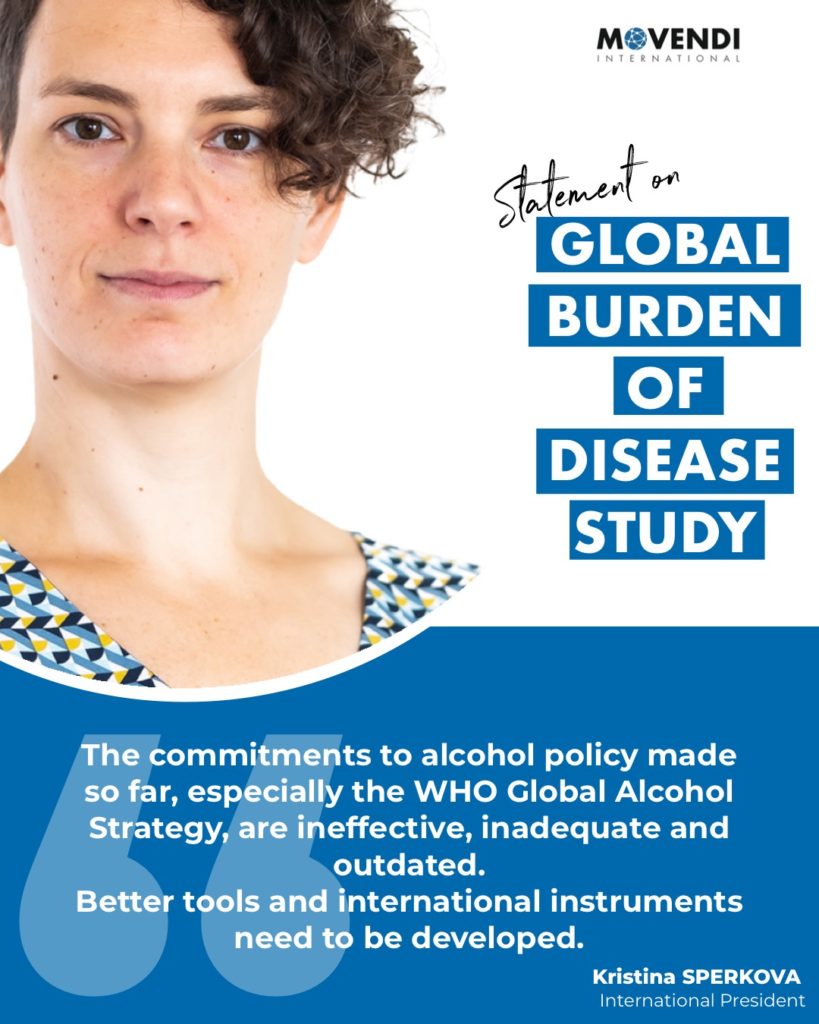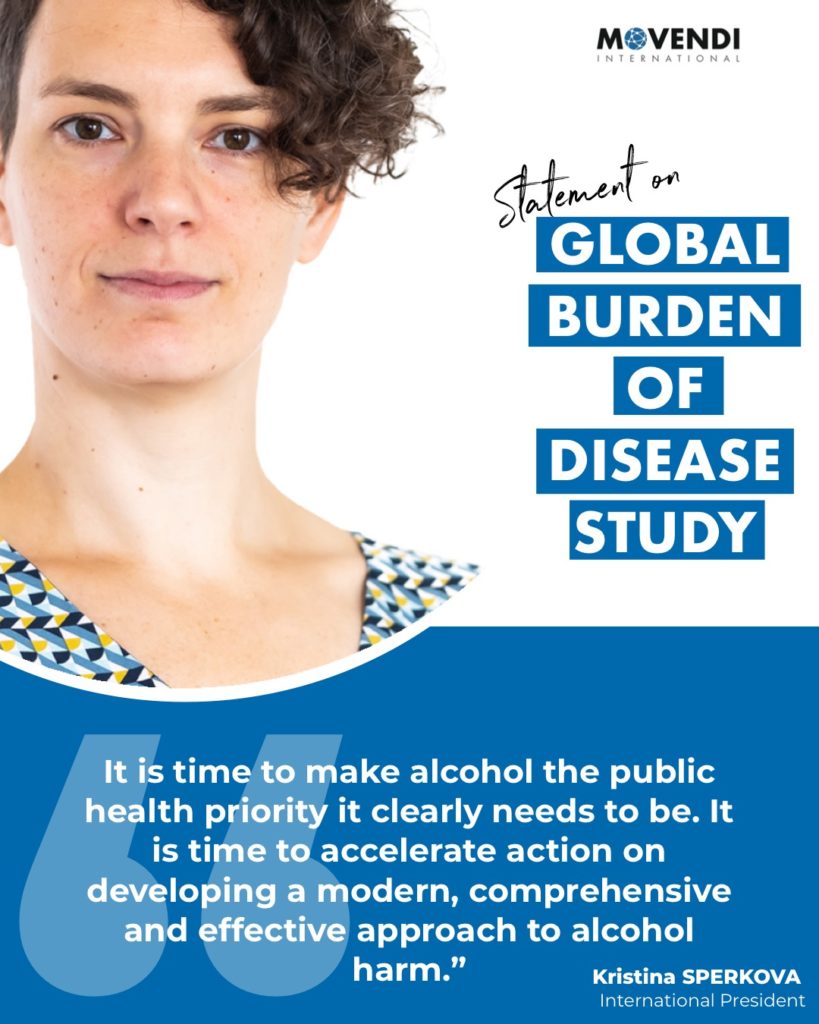Movendi International statement in reaction to latest findings of the Global Burden of Disease study 2019
The Global Burden of Disease study for 2019 led by the Institute of Health Metrics and Evaluation and published in The Lancet has found that failure in tackling preventable non-communicable diseases has made the world more vulnerable to COVID-19. The study also highlights worrying data about alcohol’s contribution to the global burden of disease.
While global healthy life expectancy – the number of years a person can expect to have good health – has increased between 1990 and 2019, it has not risen as much as overall life expectancy in 198 of the 204 countries assessed. This indicates that people are living more years in poor health.
Disability, rather than early death, has become an increasingly large share of the global disease burden – rising from around a fifth (21%) of total burden in 1990 to more than a third (34%) in 2019.
Over the past decade, large and worrying increases have been noted in exposure to several highly preventable risks including alcohol use, other drug use, obesity and high blood sugar. These risks contribute heavily to the growing NCD burden in the world.
The members of Movendi International are deeply concerned by the new findings of the Global Burden of Disease study 2019 and what they reveal about the global alcohol burden,” says Kristina Sperkova, International President of Movendi International.
The new data shows that alcohol causes massive harm early in people’s lives and that alcohol-related disability extends across the life-course, adversely affecting health, quality of life and people’s capacity to contribute to their families, communities and the economy.
Kristina Sperkova, International President, Movendi International
Alcohol remains one of the leading risk factors contributing to the global burden of disease.
- Alcohol is the eighth leading preventable risk factor for disease.
- The contribution of alcohol to the global disease burden has been increasing year by year from 2.6% of DALYs* in 1990 to 3.7% of DALYs in 2019.
- In high income countries alcohol use is the second fasted growing risk factor and in LMICs it is the fourth fastest rising risk factor.
- Alcohol is the second largest risk factor for disease burden in the age group 10-24 years.
- Alcohol is the largest risk factor for disease burden in the group 25-49 years.
This could be avoided because best buy alcohol policy solutions are proven and available but our governments have largely failed to make alcohol policy the priority it should be,” comments Ms. Sperkova.
As a consequence, alcohol’s contribution to the global disease burden is growing, not shrinking. The fact that alcohol has remained – over a thirty year period – the number one risk factor for disease burden among the 24 to 49-year olds is truly shocking.
Kristina Sperkova, International President, Movendi International
Already in 2010, the WHO member states unanimously adopted the World Health Organization Global Alcohol Strategy. Based on that landmark decision, alcohol was then also included in the 2013 Global Action Plan on NCDs, adopted by the World Health Assembly, in which governments committed to a voluntary goal of reducing per capita alcohol use by 10% until 2025.
Nevertheless, implementation of the WHO Global Alcohol Strategy has been and is inadequate, flawed according to a Movendi International analysis submitted to the WHO. Recent landmark studies have shown that global goals of alcohol use reduction remain out of reach. In fact, in several parts of the world, alcohol consumption is even increasing.
It shows that the commitments made so far on international level, especially the WHO Global Alcohol Strategy, are ineffective, inadequate and outdated,” says Ms. Sperkova.
The current level of political attention, commitment and resource allocation for alcohol prevention and control is far from where it should be. Better tools and international instruments need to be developed.
It is time to make alcohol policy the public health priority it clearly needs to be. It is time to accelerate action on developing a modern, comprehensive and effective approach to alcohol harm.”
Kristina Sperkova, International President, Movendi International
— END
Notes to the editors
More about the GBD Study
The Global Burden of Disease (GBD) study is a resource providing understanding of the changing health challenges facing people across the world in the 21st century. The GBD is led by the Institute for Health Metrics and Evaluation (IHME) and published in The Lancet journal. It is the most comprehensive worldwide observational epidemiological study to date. The information from the study informs clinicians, researchers, and policy makers to promote accountability, and improve lives worldwide.
The 2019 GBD study analyzed 286 causes of death, 369 diseases and injuries, and 87 risk factors in 204 countries and territories. The study shows the preparedness – or lack thereof – of countries’ public health systems in terms of tackling underlying health issues which increase the impact of the COVID-19 pandemic. The failure of countries’ public health systems to tackle preventable risk factors has made the world population highly vulnerable to the ongoing pandemic brewing the perfect storm, fueling COVID-19 deaths.
Evidence sources
- Science Digest: Global Burden of Disease study 2019
- Science Digest: Alcohol Use, Burden, Policy: Systematic Analysis For Global Burden Of Disease Study 2016
- Movendi International analysis: Movendi International response to World Health Organization discussion paper on implementation of the WHO global alcohol strategy since its endorsement, and the way forward
- The alcohol burden on health systems: Report on alcohol and health and well-being for all (SDG 3), see pages 8-24 and especially pages 21-24
Kristina’s statements



About Movendi International
With 148 Member Organization from 58 countries, Movendi International is the largest independent global movement for development through alcohol prevention. We unite, strengthen and empower civil society to tackle alcohol and other drugs as serious obstacles to development on personal, community, societal and global level.
